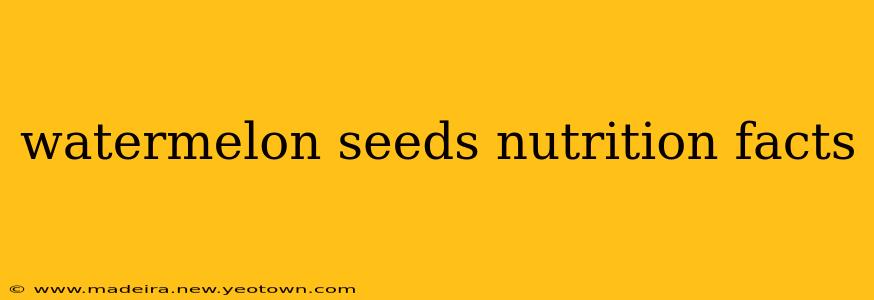Watermelon – the quintessential summer treat, juicy, refreshing, and undeniably delicious. But how many of us, after enjoying the sweet flesh, casually toss aside the seeds without a second thought? We're here to tell you: you're missing out! Watermelon seeds, often overlooked, are a nutritional powerhouse packed with surprising health benefits. Let's delve into the fascinating world of watermelon seed nutrition.
What are the nutritional benefits of watermelon seeds?
Watermelon seeds are a nutritional goldmine, boasting a remarkable profile of vitamins, minerals, and healthy fats. They're a fantastic source of magnesium, which is crucial for muscle function, blood sugar control, and blood pressure regulation. They also contain a significant amount of zinc, essential for immune function and wound healing. Beyond these, watermelon seeds are rich in iron, manganese, copper, and phosphorus, all vital for various bodily functions.
Furthermore, they're a good source of healthy fats, primarily unsaturated fats, which are beneficial for heart health. These fats contribute to lowering bad cholesterol levels and reducing the risk of heart disease. The seeds also contain various antioxidants, which help protect your cells from damage caused by free radicals.
Are watermelon seeds good for weight loss?
This is a question many people have. While watermelon seeds themselves aren't a magic weight-loss bullet, their nutritional composition can contribute to a healthy weight management strategy. Their high protein and fiber content can promote feelings of fullness and satiety, helping to curb appetite and reduce overall calorie intake. The healthy fats they contain also contribute to sustained energy levels, preventing energy crashes that often lead to unhealthy snacking. Remember, weight loss is a holistic process, and watermelon seeds are best incorporated as part of a balanced diet and exercise routine.
What are the potential health benefits of consuming watermelon seeds?
The nutritional richness of watermelon seeds translates to a multitude of potential health benefits:
- Improved Heart Health: The healthy fats and minerals in watermelon seeds contribute to maintaining healthy blood pressure and cholesterol levels.
- Boosted Immunity: The zinc and other nutrients support a robust immune system, helping your body fight off infections.
- Enhanced Energy Levels: The healthy fats and protein provide sustained energy, preventing those mid-afternoon slumps.
- Better Blood Sugar Control: The magnesium content plays a crucial role in regulating blood sugar levels.
- Improved Digestive Health: The fiber content aids in digestion and can prevent constipation.
How many watermelon seeds should I eat per day?
There's no magic number, but moderation is key. A small handful (about 1-2 tablespoons) of shelled watermelon seeds daily is a great way to incorporate them into your diet without overdoing it. Remember, while they are nutritious, they are also relatively calorie-dense, so it’s best to consume them in moderation as part of a balanced diet.
How can I eat watermelon seeds?
You don't have to eat them straight from the melon! There are numerous creative ways to enjoy the delicious crunch and nutritional benefits of watermelon seeds:
- Roasted: Roasting enhances their flavor and brings out a delightful nutty taste. Simply toss them with a little oil and seasoning and roast until golden brown.
- Added to Salads: Sprinkle roasted or raw seeds on top of your favorite salads for added crunch and nutrition.
- Ground into Flour: Ground watermelon seeds can be incorporated into baked goods, adding a unique flavor and nutritional boost.
- Added to Smoothies: A handful of seeds blended into your smoothie adds a healthy dose of nutrients and fiber.
Are there any side effects of eating watermelon seeds?
In general, watermelon seeds are safe for consumption. However, consuming excessive amounts may lead to digestive discomfort, such as bloating or gas, due to their high fiber content. For individuals with nut allergies, it's recommended to exercise caution, as there have been rare instances of cross-reactivity reported. Always listen to your body and pay attention to any unusual reactions.
From overlooked scraps to nutritional stars, watermelon seeds deserve a place in your diet. So next time you enjoy a juicy watermelon, don't forget to appreciate the nutritional treasures hidden within those tiny seeds. They’re a delicious and convenient way to boost your health!

